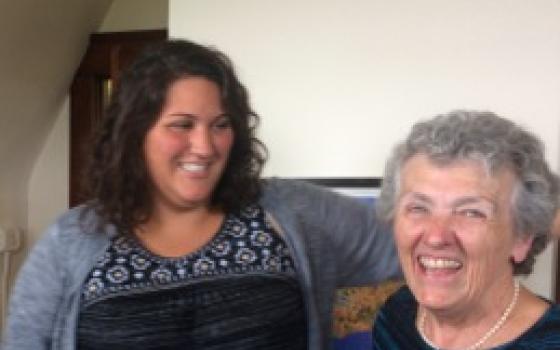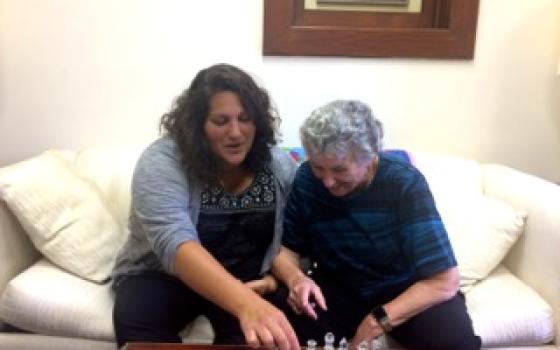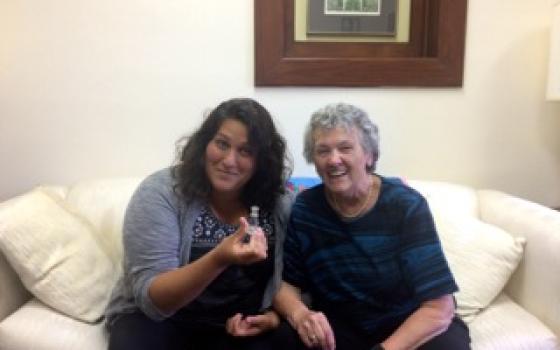A 20-something raging extrovert walks into a Benedictine monastery.
Sounds like the start of a bad joke, doesn't it? Well, it actually happened. I, Tinamarie Stolz, a 20-something raging extrovert, walked through the doors of Mount Saint Benedict Monastery in Erie and began a 10-week internship with Sr. Joan Chittister, a Catholic feminist nun.
I knew two things walking through those doors:
1. The church needs to eliminate gender stereotypes so young women can develop into the fullness of who God made them to be;
2. Progressive religious sisters are imperative to the spiritual health of young Catholic women and the official church.
How did I end up interning for a Catholic feminist nun?
I grew up in a warm, practicing Catholic family. At 3 years old, I could not understand my mother's concern about me hugging strangers in the grocery store because Jesus clearly said to love everybody.
And I always knew girls were powerful. I have a distinct memory from third-grade gym class. My male teacher, whom I adored, said, "We're playing basketball today. Make sure you guard each guy."
I blurted out, "Or girl!"
He looked me in the eyes, and with a genuine awareness of the stand I took, replied, "That's right, or girl! I apologize."
It was the first time I vocalized anything feminist, and a man I admired praised me for it.
As I grew up, I witnessed how vile sexism is. As an undergraduate communications major, I learned that the media, specifically advertisers, sexualize, objectify and create unhealthy beauty expectations for women to sell products.
As a resident assistant in the dormitory, I witnessed the battles young women fight each day: sexual violence, sexist comments, mental health issues, abuse and body-image issues.
As a freshman in 2010, I simultaneously joined a Christian group and a feminist group. The feminist group opened my eyes to systemic sexism while the Christian group provided a place to spiritually transition into college. In the end, I couldn't help but feel too feminist for the Christians and too Christian for the feminists. I began to ask myself, "Why can't my church support women's equality? Justice is a Gospel value."
For most of my life, I had unconsciously accepted that women were simply not part of the Christian story in a significant way. For 24 years, I went to church every Sunday, attended Sunday school, received sacraments, volunteered, and led a youth group. But it took a master's degree in theology to be introduced to St. Hildegard, liberation theology, and Sister Joan.
The joke goes, "What is the best way to lose your faith in God? Work for the church or study theology." I was doing both, working as a campus minister as I worked toward my master's. The more I learned about the church's teachings on women, the angrier, sadder and more isolated I grew. I slammed into my breaking point when I learned the specifics of why I was too female to stand in persona Christi, or in the person of Christ.
As a woman, I could be like Jesus, but not like Jesus enough to stand in Christ's place. I was not male enough to bless the most stable and precious thing I knew — the Eucharist. As if Christ was somehow distant from me. Theologically, this did not make sense, and spiritually, it crushed me, as I felt a strong call to ministry, specifically campus ministry.
So I started going to a Lutheran church.
I have great respect and admiration for the Lutheran tradition, but it wasn't home. I felt spiritually homeless.
"I heard God wrong," I thought. "I'm not supposed to be a minister. If I'm a feminist, I can't be Catholic anymore — the church doesn't want me."
For a second, I thought I was wasting my life. But instead of staying silent, I uttered my concerns to two of my brilliant female professors at grad school and found I was not alone.
It turned out there were (and are) many strong, faithful and theologically educated women who saw the church's teachings through similar eyes. They helped me see that feminism was a holy and valid way to navigate the world; in fact, they encouraged me to write a master's thesis on this topic and walked me through the nitty-gritty theological components of the church's teachings on women's nature. They taught me to theologically combat androcentric garbage. Most importantly, they reminded me that God was, and will infinitely be, greater than any sexism or androcentric theology. They kept me Catholic.
When I learned about Sister Joan and the Benedictine Sisters of Erie, my recent discoveries solidified. The combination of knowing faith-filled women in academia and intelligent women in religious life meant my views on women were holy, and I wasn't a bad Catholic for holding or voicing them.
If religious sisters could be Catholic and feminist, I could be, too. If feminist sisters had a home in the church, I could belong. If religious sisters' feminism came straight from the Gospel, I wasn't crazy for thinking mine did. If they were holy, so was I.
In her book Heart of Flesh: A Feminist Spirituality for Women and Men, Sister Joan writes: "Feminists are asking women and men not to buy into patriarchal systems that destroy them both. Feminism comes to bring both men and women to the fullness of life, the wholeness of soul, for which we were all made in the image and likeness of God."
I want the church to completely and unabashedly support women in their fullness, as I know our God does. A woman living in fullness is being exactly who God is calling her to — no limits or pressure from the church to fit stereotypical roles or characteristics.
When I was little, my mom sang me a lullaby every single night:
You are very special; there's no one quite like you. Created by the master, God made you to be you. You are very special, exclusively designed. You are very special, and I'm so glad you're mine. You were handmade by God. He fashioned your heart. You were handmade by God. Unique in all your ways. You were handmade by God. He knew you from the start.
She repeatedly gave me the message so many Catholic women never get: You are handmade, with all your characteristics, by God. Limiting women is limiting God. Feminism begins with faith in Christ and love for the Gospel. To sisters and all liberated Catholic women: Young women need you — your voice, story, encouragement and your feminism.
[Tinamarie Stolz was an intern for Sr. Joan Chittister and the Benedictine Sisters of Erie, Pennsylvania, from May 30 to July 28, 2017.]



